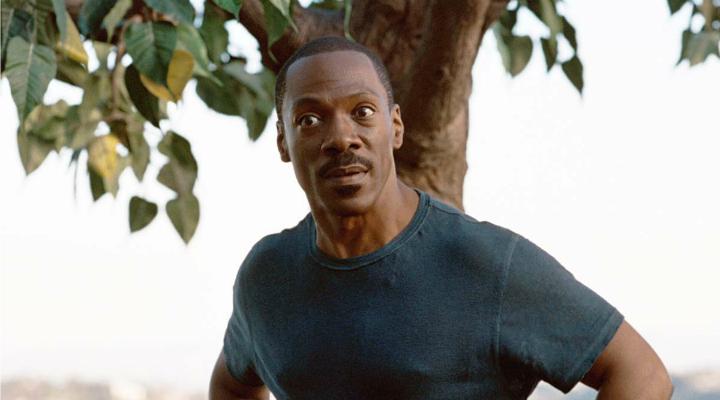I have something important to say. Be quiet.
Eddie Murphy’s latest movie, “A Thousand Words”, is a departure from the typical, in that his character Jack McCall doesn’t speak. How difficult it must have been to write the dialogue.

Jack McCall is your typical smarmy, motormouth book agent who can put a commercial spin on anything. When McCall is sent to sign a book deal with Dr. Sinja (Cliff Curtis), one of the “greatest nondenominational spiritual leaders” of the ages, McCall doesn’t think much of Sinja at first (“I have a spiritual movement every time I eat a bran muffin,” he says). Later in the same day that he closes the deal, in a very Freaky-Friday-esque manner, the whole house shakes and a bodhi tree from Dr. Sinja’s garden sprouts in his own backyard. In a stunning display of plot-furthering stupidity, he decides to keep it.
The next morning, he finds out that the Sinja’s book is only five pages long. As McCall rants, Sinja notices that leaves fall with each of McCall’s words. In a calm manner echoing many cliched gurus of other Dreamworks movies, he informs McCall that he only has a thousand words to live. Then he leaves for a three-day conference in Bolivia with the words, “Keep quiet. How hard can it be?” And with those words, it begins.
The rest of the movie is spent as the audience gets a kick out of watching Eddie Murphy try to keep his mouth shut. Anyone with a smidgen of knowledge of his previous characters knows that this talkativeness is characteristic of Murphy himself, so it almost seems as though the role was written for him. Naturally, no one could pull off the agony of being quiet better than Murphy, so it was interesting to see the many ways his face contorted as he tried desperately not to talk.

There is other comic relief throughout the film, although it’s of the less classy variety. It comes partly from McCall’s dialogue and partly from McCall’s antics as he tries to keep himself quiet, with a good dash of goofiness from nerdy supporting characters, especially his secretary (Duke Clark). It is only then that McCall realizes how much the relationships in his life were built upon communication. Without it, his job and marriage go to pieces within the span of three days.
Its only serious moments are, regrettably, dipped in cheese like fondue — McCall realizes that he must find inner peace (Kung Fu Panda, anyone?) in order to reconcile with the tree and with his ultimate death. He must make his words count, so he has to prioritize. Order coffee or tell his wife he loves her? It is a difficult choice to make.
This movie bears a much-needed message. We are often taught about the value of communication, but the value of listening is under-emphasized. Especially in the digital media age, everyone has something to say, but so much of it is meaningless in the larger scope of life. “A Thousand Words” can be summarized in three words: Silence is golden. And there is no one I can think of better to teach this lesson than Murphy.
This movie is not traditional Eddie Murphy fare, as it borders on philosophical and emotional, but it’s good in that it makes one think without making one’s head hurt (this means you, Inception) and the funny bits along the way make it all the more enjoyable to watch. And that is what counts.






















